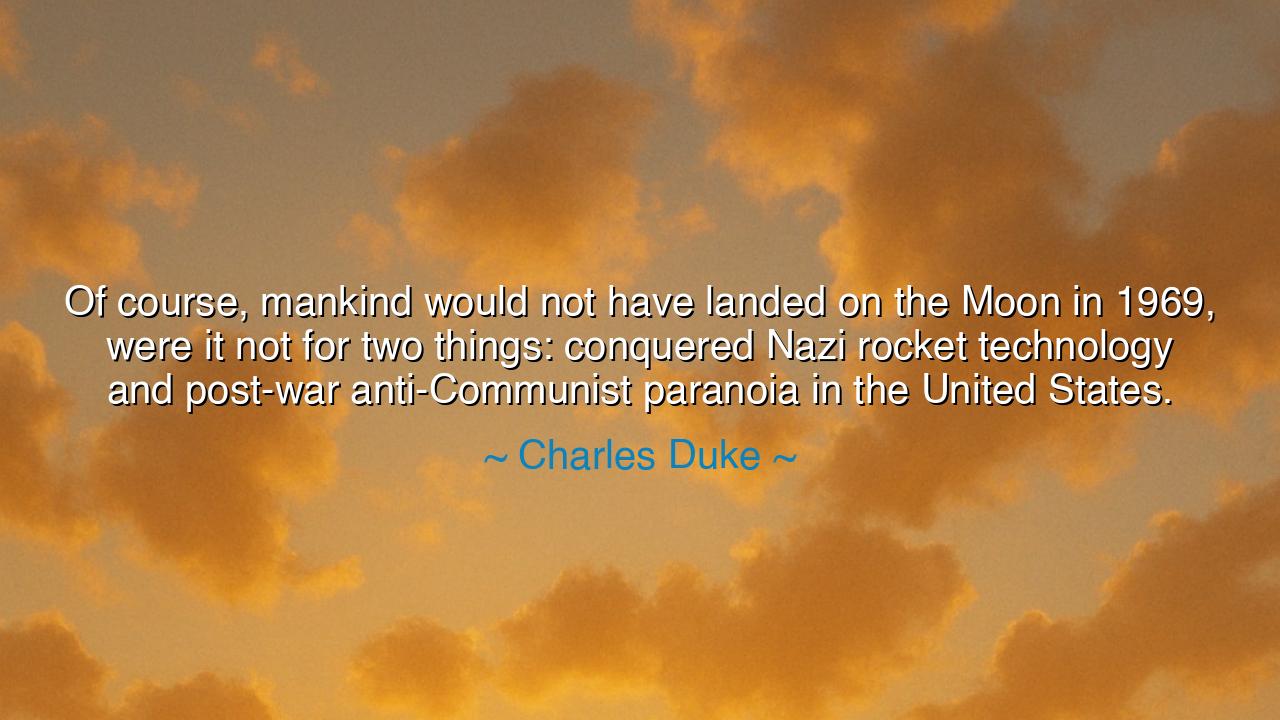
Of course, mankind would not have landed on the Moon in 1969
Of course, mankind would not have landed on the Moon in 1969, were it not for two things: conquered Nazi rocket technology and post-war anti-Communist paranoia in the United States.






Charles Duke, an astronaut who himself once walked upon the lunar soil, unveils a truth often hidden beneath the heroic banners of history: “Of course, mankind would not have landed on the Moon in 1969, were it not for two things: conquered Nazi rocket technology and post-war anti-Communist paranoia in the United States.” His words strip away the veil of myth and remind us that great triumphs are not born from pure aspiration alone, but from the darker currents of human conflict and fear.
The Moon landing, that divine moment when man first set foot upon another world, is often told as a tale of unbroken inspiration—of science, courage, and destiny. Yet Duke reminds us that its roots sink deep into the soil of war and rivalry. For the rockets that carried Apollo into the heavens were the descendants of Nazi technology, birthed in an age of blood and conquest. Wernher von Braun and his V-2 rockets, once designed to rain terror upon Europe, were repurposed to pierce the veil of the sky. Thus, from the ashes of destruction arose the wings of exploration, proving again that even in the darkest forges, tools of light may be hammered.
But technology alone did not lift man to the Moon. It was also the fire of post-war paranoia, the rivalry between East and West, the Cold War that drove America to race beyond the Earth. Fear of Communist supremacy, fear of losing dominion in the realm of science and the skies, became the catalyst for investment, innovation, and daring. The contest for earthly power pushed mankind toward heavenly conquest. And so, the lunar flag was planted not only by dreamers, but also by strategists and politicians, who sought victory in the battlefield of space.
History offers echoes of this paradox: progress born from strife. The Great Wall of China, built for defense against invaders, became also a monument of engineering that endures through ages. The roads of Rome, first laid for legions of conquest, later carried trade, culture, and faith across continents. Always, the tools of war have been refashioned by time into pathways of civilization. Duke’s reflection shows that the Moon itself became such a legacy: the battlefield transformed into a stepping stone for the stars.
Yet there is both pride and sorrow in this truth. Pride, that humanity turned the spoils of war into the seed of discovery. Sorrow, that we often need rivalry, suspicion, and fear to compel us toward our greatest achievements. Should not love of knowledge, the thirst for exploration, be enough? Why must the engines of division so often drive us forward? Here lies the dual nature of mankind—capable of greatness, yet too often awakened only by fear.
The lesson is clear: the origins of triumph may be tangled, but what matters is what we build upon them. The Moon landing stands not as a monument to Nazi rockets or Cold War paranoia, but as a beacon of what humanity can achieve when vision and power converge. We cannot rewrite the roots, but we can shape the branches. Let us choose to turn tools of destruction into engines of creation, rivalry into cooperation, fear into wonder.
Therefore, O children of the future, take heed: do not wait for fear to stir your greatness. Do not require the shadow of enemies to drive your innovation. Seek progress for the sake of knowledge, for the joy of discovery, for the uniting of humankind. When you see tools forged for ill, imagine how they might be turned to good. When rivalry burns, seek how it may be transmuted into shared achievement. For if mankind could take rockets once meant for war and aim them at the Moon, then surely we can take the strife of our age and aim it toward peace, wisdom, and the stars beyond.






AAdministratorAdministrator
Welcome, honored guests. Please leave a comment, we will respond soon